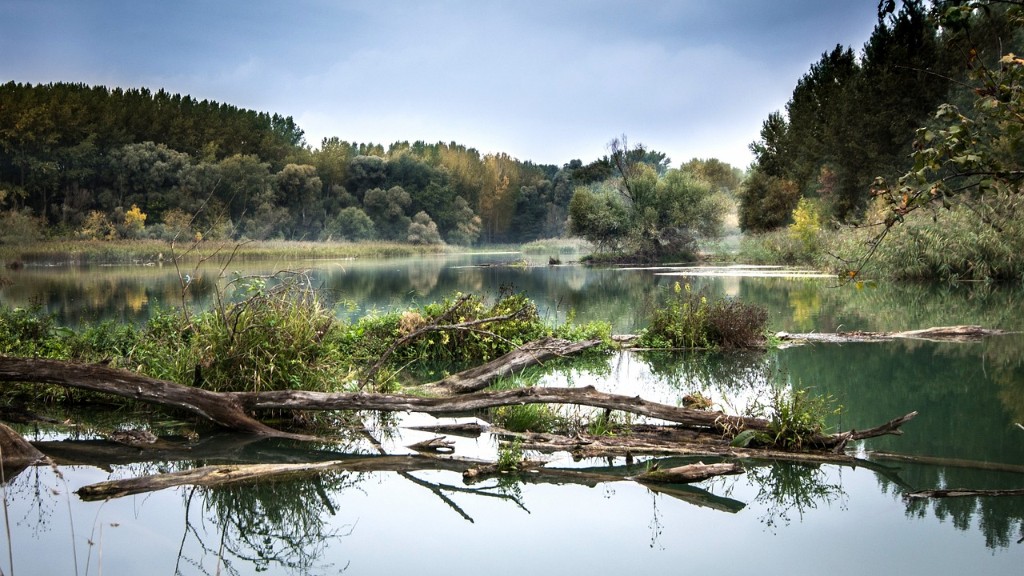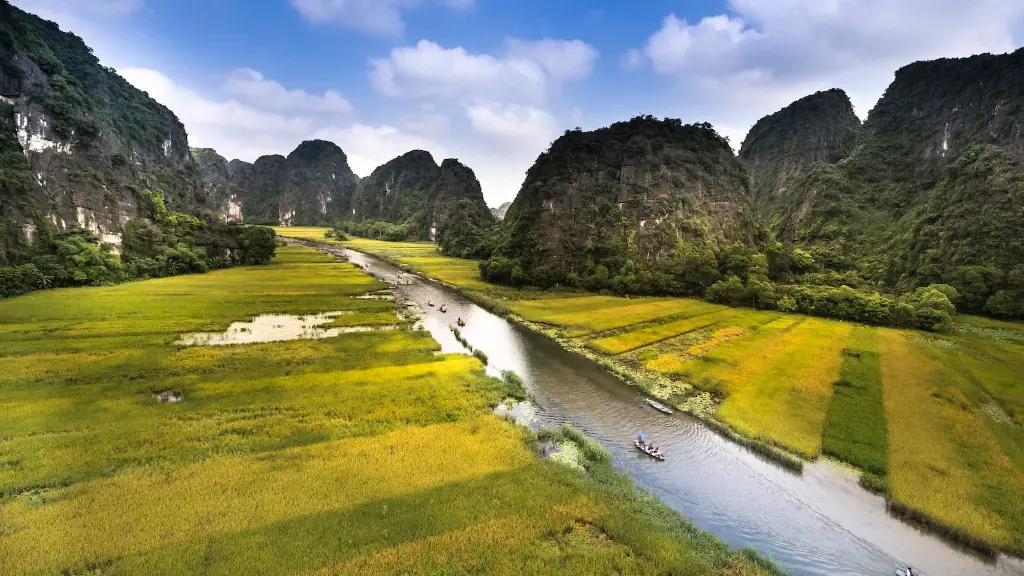The Nile River is one of the most important waterways in the world. It has played a vital role in the development of civilizations since ancient times, particularly in ancient Egypt. The Nile River’s waters have allowed people to survive and thrive in an otherwise dry and arid landscape.
The river provided ancient Egyptians with a seasonal source of food and allowed them to build an organized, complex civilization. It was a source of transport, a way to connect isolated communities, and a source of fuel and energy. Ancient Egyptians relied on the Nile to carry their cargo and goods, and this enabled them to trade with distant lands. They also used the waters of the Nile to irrigate the land and make it more fertile, helping them to produce an abundance of food that could be stored for later use.
The land surrounding the river was filled with resources that allowed the ancient Egyptians to sustain their early civilization. The mineral-rich depression of the Nile allowed them to build large cities and develop an extensive system of agriculture. In addition, minerals from the river were used to make pottery, jewelry, and other necessary items. The Nile also provided them with access to the Mediterranean Sea, helping to make sea transportation easier. This enabled them to trade with other Mediterranean cultures and gain access to rare resources.
Due to its abundance of resources and its ability to support large populations, the Nile was a major source of power and influence in the ancient Egyptian world. Its waters supported a large number of people and allowed them to flourish in an otherwise harsh and unforgiving environment. It was also essential to the growth of Egypt’s military, allowing them easy access to allies and enemies. As the Egyptians grew in power and influence, they were also able to build incredible monuments and structures along the banks of the Nile.
The river has also been instrumental in Egypt’s social development. The Nile is often seen as a representation of life, and the Egyptians revered it for its life-giving properties. The Egyptians believed in the afterlife and believed that life was a cycle that began and ended in the waters of the river. As such, the river was seen as a symbol of death and rebirth, and it was believed that by making offerings to the Nile, a person could ensure a good afterlife. This reverence for the Nile River was reflected in the architecture and culture of ancient Egypt.
Ultimately, the Nile was essential to the development of ancient Egypt. Without the river, the Egyptians would not have been able to build a sophisticated civilization. Instead, they would have been relegated to a nomadic lifestyle, moving from place to place in search of food and shelter. The Nile allowed the Egyptians to build an organized society that was capable of lasting for centuries. It was and still is one of the most important waterways on earth.
Role of Religion in Ancient Egypt
Egyptian religion was deeply intertwined with the Nile River. It was believed that the river was created by the gods and that its waters were sacred. The annual flooding of the Nile was seen as a manifestation of the gods, and the riverside was the site of many important shrines and temples. In addition, the Egyptians believed that the gods resided on the river banks, which made them a suitable location for worship. It was believed that by honoring the gods and respecting their presence, they could ensure a plentiful source of Nile water and use it to create wealth and abundance.
The Nile was also an important source of spiritual power and energy. The river was seen as a symbol of creation, fertility, and growth, and was believed to have a connection to the afterlife. The Egyptians believed that by honoring the spirit of the Nile, they could ensure a prosperous afterlife for themselves and their families. This spiritual reverence was also reflected in their monuments and art, with many containing symbols and images of the river.
The importance of the Nile River to the ancient Egyptians was also linked to the belief in life after death. The river was seen as a place of transition and rebirth, and it was believed that by making offerings to the Nile and following its sacred rituals, a person could ensure a good afterlife. This connection between the river and the afterlife was reflected in funerary rituals, which often included offerings and prayers to the river god.
In conclusion, the Nile River was a vital factor in the development of ancient Egypt’s civilization. It provided ancient Egyptians with an abundance of resources and enabled them to build a complex, organized society. The river was also seen as a source of spiritual power, and its waters were venerated by the Egyptians for their life-giving properties. Without the Nile, ancient Egypt would not have been able to grow and thrive as it did for centuries.
Economic Impact of the Nile
The importance of the Nile River to the ancient Egyptians was not just spiritual, it was also economic. The river’s annual floods provided them with plenty of fertile soil, enabling them to produce a wide variety of crops and foods. This encouraged a more settled lifestyle, allowing them to build a vibrant, sophisticated civilization that enjoyed a high level of economic activity.
The economic activity of ancient Egypt also benefited from the river’s navigability. The navigable stretches of the river allowed ancient Egyptians to transport goods by water, which was much faster and easier than travelling by land. This allowed them to trade with distant lands, which provided them with access to exotic materials and helped them to increase their wealth.
The river also allowed the Egyptians to build an extensive network of canals and irrigation systems. This allowed them to irrigate large portions of land and make it suitable for large-scale agriculture. By harvesting the grains and fruits from these fields, the Egyptians were able to produce an abundance of food that could be stored for later use. This agricultural surplus also supported a thriving trade network, helping the ancient Egyptians to build a strong economy.
In addition to this, the mineral-rich soils of the Nile valley were an important source of building materials. The Egyptians were able to use these materials to construct their monuments, palaces, and other important structures. This enabled them to build a complex and impressive infrastructure, which further served to strengthen their economic position.
The Nile was also a source of transportation. The navigable stretches of the river allowed the Egyptians to transport goods and people quickly and efficiently. The river also provided them with easy access to the Mediterranean Sea and trade routes to other cultures, so they did not have to rely solely on land routes.
In conclusion, the Nile River was essential to the development and growth of ancient Egypt’s economy. It provided them with an abundance of resources, allowed them to cultivate large portions of land, and enabled them to trade with distant lands. It also provided them with a means of transportation, making trade and travel much easier. Without the Nile River, it is unlikely that the Egyptians would have been able to develop a thriving economy and prosperous civilization.
Geopolitical Implications of the Nile
In addition to economic and spiritual implications, the Nile was also a major factor in the political landscape of ancient Egypt. The river provided the Egyptians with easy access to the Mediterranean Sea, which gave them access to distant cultures and distant resources. This enabled them to build a powerful trading empire and expand their influence in the region.
The Nile also acted as a natural barrier to other cultures. It was difficult to cross, making it a formidable obstacle for enemies. This allowed the Egyptians to keep their borders secure and their people safe from outside forces. The river was also seen as a symbol of power, and its vitality and abundance were seen as signs that the Egyptian gods were blessing the country.
The Nile’s role in allowing the Egyptians to build a powerful military was also important. Its waters allowed them to carry their supplies and troops quickly and efficiently, allowing them to make advances on their enemies faster than they could have by land. This enabled them to build a powerful military, which was essential in ensuring their success as a civilization.
Finally, the Nile was a major source of unity and shared identity. Its vast, seemingly endless banks provided the Egyptians with a space to come together to celebrate their shared culture and beliefs. Its wealth and abundance also provided them with a sense of security, helping to make them believe that the gods were looking out for them.
In conclusion, the Nile was an important factor in the geopolitical landscape of ancient Egypt. It served as a natural barrier to outsiders, provided a means of transportation, and enabled the Egyptians to access distant lands and resources. It also acted as a symbol of strength and power and allowed them to build a strong military. Finally, it was a source of unity and identity, and its waters were seen as a sign of the gods’ favor.
Cultural Significance of the Nile
The cultural significance of the Nile to the ancient Egyptians is undeniable. The river was seen as a source of life and abundance, and it was venerated by the Egyptians for its life-giving properties. It was also seen as a representation of the gods, and its waters were believed to be divine and sacred.
The Egyptians also believed that the annual floods of the Nile were a manifestation of the gods. This event was celebrated with great festivities and acts of worship, as it was believed that the gods were granting the people a new life. The Nile was also believed to be connected to the afterlife and was seen as a means of transition and rebirth.
In addition to this, the Nile was a major source of inspiration for the Egyptians. The river’s abundance and vitality were seen as symbols of life and prosperity, and monuments and art often contained symbols and images of the Nile. As such, the Nile has come to symbolize the ancient Egyptian culture, and its importance in their spiritual and cultural beliefs remains apparent to this day.
The Nile was also a major part of the Egyptian’s social life. The river’s navigable sections were a popular place for recreation, and its banks were often used as a gathering spot for festivals and other celebrations. The river was also used for transportation, allowing the Egyptians to easily and quickly move goods and people up and downstream.
In conclusion, the Nile was a major source of inspiration and spiritual power for the ancient Egyptians. It was seen as a source of life and abundance, a symbol of the gods, and a source of spiritual power. The river was also a source of recreation and a popular gathering spot for festivities. All in all, the Nile was an essential part of the Egyptian culture, and its importance in their beliefs and practices still remains to this day.
Environmental Impact of the Nile
The Nile has had a tremendous impact on the environment, both in ancient times and in modern times. In ancient times, the river’s waters were used for irrigation, enabling the Egyptians to cultivate large swaths of land and produce an abundance of food. This allowed them to build a complex and sophisticated civilization that lasted for centuries. However, this extensive farming also led to the depletion of soil nutrients, making the land less fertile over time.
In addition, the river often flooded, bringing large amounts of sediment to the areas surrounding it. This led to land being slowly submerged and a rise in river banks, resulting in vast changes to the local environment. This was especially true of areas near the sea, where the river had a pronounced effect on the coastline.
Today, the Nile is still having a major impact on the environment. Its waters are used for irrigation and power, but these are often taken from unsustainably. This has led to overuse of the river, resulting in its waters being too polluted to be safely used for agricultural purposes or drinking water. In addition, the river often floods, resulting in large-scale damage to property and the displacement of people living near it.
The Nile has also caused a rise in temperatures in the surrounding areas. This is due to the river’s absorptive properties, which trap heat, leading to warmer temperatures. This has had an effect on local wildlife, with some species adapting to the changing environment while others struggle to survive.
In conclusion, the Nile has had both a positive and negative effect on the environment. Its waters have been used to irrigate large portions of land, providing the Egyptians with an abundance of food. However, overuse of the river’s waters has caused them to become polluted and put local wildlife at risk. In addition, the river’s flooding has led to changes in the local environment, making it difficult for some species to adapt.





